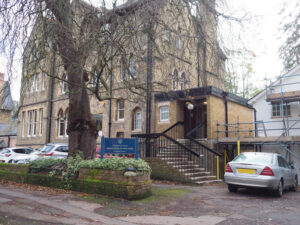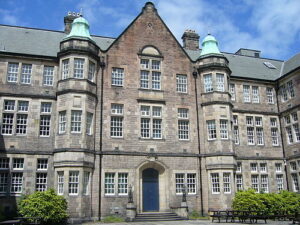Week 7: Affinity Ratings
Bayne, Gallagher and Lamb (2014) suggest that “the material campus continues to be a symbolically and materially significant mooring” for students (p. 581). In my previous post, I said that I do not consider myself to be a student at University of Edinburgh. I thought I’d have a little fun with this post as I try to articulate why I feel this way.
I have had quite an interesting educational journey in terms of learning spaces. In an informal spinoff of Bayne, Gallagher and Lamb’s (2014) study that will never be funded or cleared by any ethics committee, I will attempt to derive affinity ratings for my alma maters.
The categories (inspired by the subsections in Bayne, Gallagher and Lamb’s paper) used in this study are:
- The imagined campus (IC) (i.e. engagement with campus space)
- Metaphysics of presence (MP) (i.e. sense of being member of the university)
- The sentimental campus (SC) (i.e. overall university life)
The four institutions that will be given affinity ratings are:
- National Institute of Education, Nanyang Technological University
- Singapore University of Social Sciences
- University of Oxford
- University of Edinburgh
The scoring system is pretty simple. For each category, I will give the institution a score of 1 to 3 (1 = low, 2 = fair, 3 = good). Therefore, the highest possible score is 9.
To prevent this post from becoming too long, I’ll provide brief explanations and notes (that may not be in full sentences) with each accompanying score.
National Institute of Education, Nanyang Technological University
Campus University; studied entirely “on-campus”; full-time; 3 months

Image taken from: http://www.learnfocus.com/stories.htm
Spent 3 months studying full-time on campus here. Pursued a Specialist Diploma in Teaching & Learning. While academic in nature, the course was “professional” because it was a requirement for my job then. Wasn’t given a matriculation card. Barely had time or any opportunity to use the facilities. Could not join any student groups. Basically, life was looking for the next classroom, studying in that classroom and sitting at the food court. Very functional and mechanical campus experience. Felt like a series of professional workshops. Felt like an “outsider’ because most of the students there were trainee teachers and my course mates and I were not.
IC = 1
MP = 1
SC = 1
Overall: 3
Singapore University of Social Sciences
Campus University; blended Learning; part-time; 4 years

Image taken from: https://www.sim.edu.sg/about-sim/pages/campusdetails.aspx
Almost all of my classes were in the evening after work. Campus felt like a ghost town. Shops were shut. Managed to make some friends but never became very close; felt more like professional networking. Most tutors were part-timers, so correspondence with them was largely digital (e.g. emails, Whatsapp). University life was non-existent as I wasn’t able to join any sports group and most events were in the day for full-timers. Met course mates in shopping malls to study on weekends. Not much “mooring” to the school.
IC: 2
MP: 2
SC: 1
Overall: 5
University of Oxford
City university; studied entirely on-campus; full-time; 1 year

Image taken from: https://www.accessguide.ox.ac.uk/15-norham-gardens
All lessons were face-to-face, but some consultation sessions were online (e.g. Skype) when either my supervisor or myself were abroad. Studied in the library mostly. Nice feeling of bumping into a course mate in the library. Played football for my college and hung out socially. While, I felt like an “insider” because I was a member of the university, it was hard to tell who was not as it was a city campus. In a way, I even viewed the cashier at Tesco as part of my whole “university experience”. Hated the tourists, they were definitely the “outsiders” because they were there just to take photos. Engagement with the campus space was limited to certain places. Never stepped foot in some of the buildings or rooms.
IC: 2
MP: 3
SC: 2
Overall: 7
University of Edinburgh

Image taken from: https://www.wikiwand.com/en/Moray_House_School_of_Education
All lessons are online. More campus engagement than with NIE, NTU because as a member of the university, I am given access to the library and all the online spaces (e.g. Moodle, Myed). I don’t exactly feel like an “outsider” now but this may be different if I were to visit UofE in person. I think I wouldn’t say to “an actual” student studying there that I study here too (even my choice of words reflect how I perceive some studying there to be more of an “insider” than me). Overall university life is very low, I am not part of any student group. I haven’t actually met my personal and blog tutors (only heard Huw’s voice).
IC: 2
MP: 1
SC: 1
Overall: 4
Conclusion
Surprisingly, I have a higher affinity for UofE than NIE, despite having never seen the former in real life. This informal light-hearted study supports Bayne, Gallagher and Lamb’s (2014) suggestion that “to define institutional and academic authenticity in terms of… bounded, ‘regional’ space” is inadequate”. For me, social connections are clearly important. However, my UofE experience still has a lower score than my UofOx’s.
Perhaps, when designing an online campus, we should move away from trying to determine what is authentic, be it physical or digital. Instead, we could attempt to create something is authentically digital, something that is unique and new.
While I might never be able to play football for Moray House, I could be part of their FIFA20 team if they had one. Online move screenings and even digital dating are other possibilities.




It’s a real shame you can’t visit Edinburgh. Like Oxford the city has a character that affects its visitors and residents. I felt that Oxford had concentric circles of increasing privilege which are missing or less obvious in Edinburgh. Outsider status is much more obtainable in Oxford. I think you have some great ideas on how to build a more robust and inclusive imagined community in Edinburgh. Essentially, it’s also a mind-set – a way of thinking about edtech that we are after too.
PS – I am happy to meet online anytime!